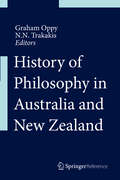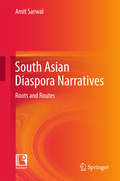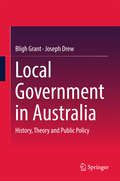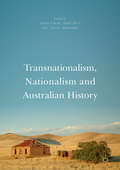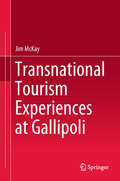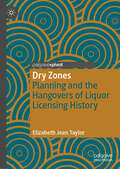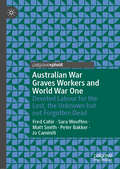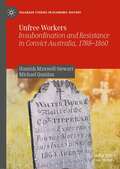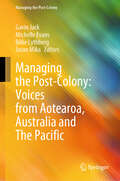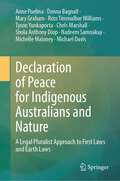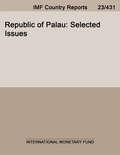- Table View
- List View
History of Philosophy in Australia and New Zealand
by Graham Oppy N. N. TrakakisThe History of Philosophy in Australia and New Zealand is a comprehensive account of the historical development of philosophy in Australia and New Zealand, from the establishment of the first Philosophy Chair in Australasia in 1886 at the University of Melbourne to the current burgeoning of Australasian philosophy. The work is divided into two broad sections, the first providing an account of significant developments and events during various periods in the history of Australasian philosophy, and the second focusing on ideas and theories that have been influential in various disciplines within Australasian philosophy. The work consists of chapters contributed by various philosophers, on specific fields of inquiry or historical periods within Australasian philosophy.
South Asian Diaspora Narratives
by Amit SarwalSome happy occasions, like the 1995 Commonwealth Writers' Prize for Best Book to Bangladeshi-Australian author Adib Khan, the 2008 Man Booker Prize to Indian born Australian writer Arvinda Adiga, and the 2013 Australian Prime Minister's Literary Award for Fiction to Sri Lankan-Australian author Michele de Krester, have boosted the self-confidence of South Asian-Australian writers in Australia. South Asian diasporic communities have also been the focus for relatively small, but constantly growing, studies by anthropologists and sociologists on the interrelation of gender, race, ethnicity and migration in Australia. The terms "Labels" and "Locations" capture numerous aspects that contribute in the making of a diasporic consciousness. This book critically examines the issues of identity, gender, family, class and caste, expressed in the short narratives of South Asian diaspora writers based in Australia. Taking an interdisciplinary approach--from literary, cultural, historical, anthropological, and sociological studies--this book engages chiefly with the oeuvre of postcolonial writers and academics, namely: Mena Abdullah, Adib Khan, Yasmine Gooneratne, Michelle De Kretser, Chandani Lokuge, Chitra Fernando, Satendra Nandan, Suneeta Peres da Costa, Hanifa Deen, Christopher Cyrill, Suvendrini Perera, Sunil Govinnage, Brij V. Lal, Sunil Badami, Glenn D'Cruz, Chris Raja, Manik Datar, David De Vos, Rashmere Bhatti, Kirpal Singh Chauli, Sujhatha Fernandes, Neelam Maharaj, Sushie Narayan, Madu Pasipanodya, Shrishti Sharma, Beryl T. Mitchell, and Sunitha. This book will, by calling upon the works of this much-neglected South Asian diaspora group, fill a lacuna in the broader critical rubric of diaspora studies.
Local Government in Australia
by Bligh Grant Joseph DrewThis book offers a general introduction to and analysis of the history, theory and public policy of Australian local government systems. Conceived in an international comparative context and primarily from within the discipline of political studies, it also incorporates elements of economics and public administration. Existing research tends to conceptualise Australian local government as an element of public policy grounded in an 'administrative science' approach. A feature of this approach is that generally normative considerations form only a latent element of the discussions, which is invariably anchored in debates about institutional design rather than the normative defensibility of local government. The book addresses this point by providing an account of the terrain of theoretical debate alongside salient themes in public policy.
Transnationalism, Nationalism and Australian History
by Anna Clark Anne Rees Alecia SimmondsUsing Australian history as a case study, this collection explores the ways national identities still resonate in historical scholarship and reexamines key moments in Australian history through a transnational lens, raising important questions about the unique context of Australia's national narrative. The book examines the tension between national and transnational perspectives, attempting to internationalize the often parochial nation-based narratives that characterize national history. Moving from the local and personal to the global, encompassing comparative and international research and drawing on the experiences of researchers working across nations and communities, this collection brings together diverging national and transnational approaches and asks several critical research questions: What is transnational history? How do new transnational readings of the past challenge conventional national narratives and approaches? What are implications of transnational and international approaches on Australian history? What possibilities do they bring to the discipline? What are their limitations? And finally, how do we understand the nation in this transnational moment?
Transnational Tourism Experiences at Gallipoli
by Jim McKayThis book offers a fresh account of the Anzac myth and the bittersweet emotional experience of Gallipoli tourists. Challenging the straightforward view of the Anzac obsession as a kind of nationalistic military Halloween, it shows how transnational developments in tourism and commemoration have created the conditions for a complex, dissonant emotional experience of sadness, humility, anger, pride and empathy among Anzac tourists. Drawing on the in-depth testimonies of travellers from Australia and New Zealand, McKay shines a new and more complex light on the history and cultural politics of the Anzac myth. As well as making a ground breaking, empirically-based intervention into the culture wars, this book offers new insights into the global memory boom and transnational developments in backpacker tourism, sports tourism and “dark” or “dissonant” tourism.
Dry Zones: Planning and the Hangovers of Liquor Licensing History
by Elizabeth Jean TaylorThis book tells the story of local-level controls on liquor licensing (‘local option’) that emerged during the anti-alcohol temperance movement of the late 19th and early 20th centuries. It offers a new perspective on these often-overlooked smaller prohibitions, arguing local option not only reshaped the hotel industry but has legacies for, and parallels with, questions facing cities and planners today. These range from idiosyncratic dry areas; to intrinsic ideas of residential amenity and neighbourhood, zoning separation, and objection rights. The book is based on a case study of temperance-era liquor licensing changes in Victoria, their convergence with early planning, and their continuities. Examples are given of contemporary Australian planning debates with historical roots in the temperance era – live music venues, bottle shops, gaming machines, fast food restaurants. Dry Zones uses new archival research and maps; and includes examples from family histories in Harcourt and Barkers Creek, a district with a temperance reputation and which closed all its hotels during the temperance era. Suggesting ‘wowsers’ are not so easily relegated to history books, Taylor reflects on tensions around individual and local rights, localism and centralism, direct democracy, and domestic violence, that continue to be re-enacted. Dry Zones visits a forgotten by-way of licensing history, showing the early 21st century is a useful time to reflect on this history as while some temperance-era controls are being scaled back, similar controls are being put forward for much the same reasons.
Australian War Graves Workers and World War One: Devoted Labour for the Lost, the Unknown but not Forgotten Dead
by Fred Cahir Sara Weuffen Matt Smith Peter Bakker Jo CaminitiThis book relays the largely untold story of the approximately 1,100 Australian war graves workers whose job it was to locate, identify exhume and rebury the thousands of Australian soldiers who died in Europe during the First World War. It tells the story of the men of the Australian Graves Detachment and the Australian Graves Service who worked in the period 1919 to 1922 to ensure that grieving families in Australia had a physical grave which they could mourn the loss of their loved ones. By presenting biographical vignettes of eight men who undertook this work, the book examines the mechanics of the commemoration of the Great War and extends our understanding of the individual toll this onerous task took on the workers themselves.
Unfree Workers: Insubordination and Resistance in Convict Australia, 1788-1860 (Palgrave Studies in Economic History)
by Michael Quinlan Hamish Maxwell-StewartThis book examines how convicts played a key role in the development of capitalism in Australia and how their active resistance shaped both workplace relations and institutions. It highlights the contribution of convicts to worker mobilization and political descent, forcing a rethink of Australia’s foundational story. It is a book that will appeal to an international audience, as well as the many hundreds of thousands of Australians who can trace descent from convicts. It will enable the latter to make sense of the experience of their ancestors, equipping them with the necessary tools to understand convict and court records. It will also provide a valuable undergraduate and postgraduate teaching tool and reference for those studying unfree labour and worker history, social history, colonization and global migration in a digital age.
Managing the Post-Colony: Voices from Aotearoa, Australia and The Pacific (Managing the Post-Colony)
by Gavin Jack Michelle Evans Billie Lythberg Jason MikaThis edited book is the second in the book series “Managing the Post-Colony”. The book series is co-edited by Nimruji Jammulamadaka (IIM Calcutta, India) and Gavin Jack (Monash University, Australia). The book series seeks to present cutting-edge, critical, interdisciplinary, and geographically and culturally diverse perspectives on the contemporary nature, experience, and theorisation of managing and organising under conditions of postcoloniality. This book specifically presents voices and perspectives from Aotearoa New Zealand, Australia, and The Pacific, locations with shared and distinctive histories and present-day experiences of colonisation and imperialism. Ways of managing, organising, and doing business in these places demonstrate cultural continuity and change in such histories, present sites of postcolonial struggle, and diverse prospects for self-determined future-making. The book explores struggles and prospects of managing in the post-colony through qualitative empirical cases, historical and legal studies, conceptual essays and provocations, and interviews with Indigenous business leaders. It contributes to the ongoing diversification, provincialisation, and decolonisation of management and organisation studies and practice. A strong focus is placed on diverse Indigenous knowledges and experiences, including those of Aboriginal and Torres Strait Islander, Pasifika, and Māori peoples, and insights into the capacity for Indigenous culture-specific modes of business to offer decolonising futures.
Declaration of Peace for Indigenous Australians and Nature: A Legal Pluralist Approach to First Laws and Earth Laws
by Anne Poelina Donna Bagnall Mary Graham Ross Timmulbar Williams Tyson Yunkaporta Chels Marshall Shola Anthony Diop Nadeem Samnakay Michelle Maloney Michael DavisThis groundbreaking book delves into the lived experiences and collective wisdom of Indigenous communities impacted by colonialism. Through collaborations with non-Indigenous colleagues, this book seeks to inform current legal practices and advocate for a transformative shift toward justice, equity, and the recognition of First Law and Earth-centered law.By presenting Indigenous stories as case studies and incorporating the collective wisdom gained through extensive discussions and exchanges with non-Indigenous colleagues, the authors highlight the ways in which Australian law falls short in upholding holistic principles and fails to align with First Law and Earth-centered law. The book invites readers to consider alternative legal futures that are rooted in respect, justice, and the well-being of both Indigenous peoples and the natural environment. Through its thought-provoking analysis, literature reviews, and insights from Indigenous leaders, this book servesas a powerful resource for legal practitioners, policymakers, scholars, and anyone passionate about social justice and environmental sustainability. The book aims to ignite meaningful dialogue and inspire concrete actions to address the historical injustices faced by Indigenous peoples while fostering a more inclusive and equitable legal framework for the generations to come.
Republic of Palau: Selected Issues (Imf Staff Country Reports #Country Report No. 14/111)
by International Monetary Fund. Asia and Pacific DeptA report from the International Monetary Fund.
